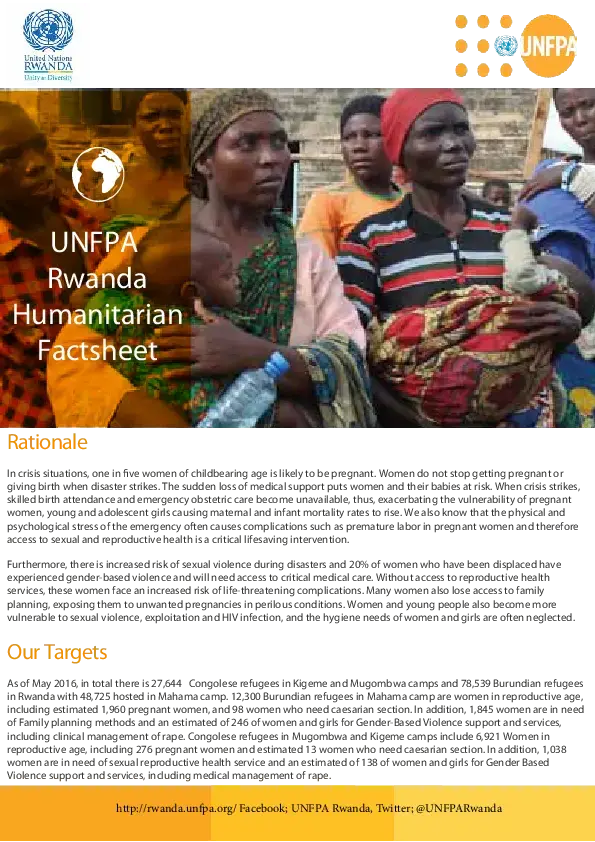Rationale
In crisis situations, one in five women of childbearing age is likely to be pregnant. Women do not stop getting pregnant or giving birth when disaster strikes. The sudden loss of medical support puts women and their babies at risk. When crisis strikes, skilled birth attendance and emergency obstetric care become unavailable, thus, exacerbating the vulnerability of pregnant women, young and adolescent girls causing maternal and infant mortality rates to rise. We also know that the physical and psychological stress of the emergency often causes complications such as premature labor in pregnant women and therefore access to sexual and reproductive health is a critical lifesaving intervention.
Furthermore, there is increased risk of sexual violence during disasters and 20% of women who have been displaced have experienced gender-based violence and will need access to critical medical care. Without access to reproductive health services, these women face an increased risk of life-threatening complications. Many women also lose access to family planning, exposing them to unwanted pregnancies in perilous conditions. Women and young people also become more vulnerable to sexual violence, exploitation and HIV infection, and the hygiene needs of women and girls are often neglected.
Our Targets
As of May 2016, in total there is 27,644 Congolese refugees in Kigeme and Mugombwa camps and 78,539 Burundian refugees in Rwanda with 48,725 hosted in Mahama camp. 12,300 Burundian refugees in Mahama camp are women in reproductive age, including estimated 1,960 pregnant women, and 98 women who need caesarian section. In addition, 1,845 women are in need of Family planning methods and an estimated of 246 of women and girls for Gender-Based Violence support and services, including clinical management of rape. Congolese refugees in Mugombwa and Kigeme camps include 6,921 Women in reproductive age, including 276 pregnant women and estimated 13 women who need caesarian section. In addition, 1,038 women are in need of sexual reproductive health service and an estimated of 138 of women and girls for Gender Based Violence support and services, including medical management of rape.
Our Intervention
UNFPA has provided critical reproductive health supplies and life-saving comodities, which include emergency Reproductive Health and dignity kits for pregnant women and vulnerable adolescents, with the aim of reducing common causes of maternal and neonatal morbidity and mortality in Kigeme, Mugombwa and Mahama camps. In addition, UNFPA supported life-saving interventions on sexual reproductive health, including emergency obstetric care, clinical management rape in Mahama camp. To save women and girls lives in Mahama camp, UNFPA supported to prevent HIV infection and unwanted pregnancies though availability of male and female condoms and through clinical management of rape including Post Exposure Prophylaxis and strengthening of referral pathway. Furthermore, the capacity of the three district hospitals surrounding the three camps which are the direct and nearest referral sites for Mugombwa, Kigeme and Mahama refugees health facilities have been increased with life savings commodities and equipment but also EmONC and Family planning/ SGBV prevention and clinical management trainings provision of quality maternal/Sexual Reproductive health services especially better management of complicated obstetrical cases and others SRH conditions


